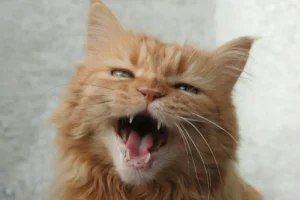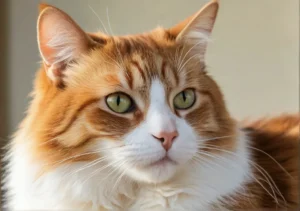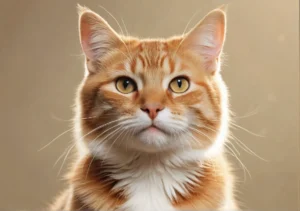Cats are mysterious creatures, known for their independent nature and unique behaviors. One common behavior that many cat owners have experienced is their deep meowing at night. This behavior can be puzzling and disruptive, leaving owners wondering why their feline friends choose the late hours to vocalize. In this blog post, we will explore the reasons behind why cats deep meow at night and how to address this behavior.
The Nature of Cats at Night
Cats are known for their mysterious and independent nature, which is particularly evident at night. While humans may be winding down for the day, our feline friends are just getting started. Cats are crepuscular, meaning they are most active during dawn and dusk. This behavior stems from their wild ancestors who were hunters by nature and needed to take advantage of low light levels to stalk their prey.
During the night, cats feel more secure and confident as the cover of darkness provides them with a sense of protection. This increase in confidence often results in more vocalizations, including deep meowing. So, if you find your cat deep meowing at night, it may just be their way of expressing their natural instincts and behavior.
Reasons Behind Nighttime Meowing
There are various reasons why cats choose to meow deeply at night, and it’s essential to understand these behaviors to better communicate with our feline companions. Communication plays a significant role in a cat’s nighttime meowing. Cats may meow deeply to express their needs, such as hunger, discomfort, or simply seeking attention.
Moreover, hunting instincts can also trigger deep meows at night. Cats are natural predators, and the nighttime environment often triggers their hunting instincts. When your cat meows deeply at night, they may be mimicking the sound of prey to attract potential targets.
Additionally, territorial behavior can also contribute to nighttime meowing. Cats are territorial animals, and they may meow deeply at night to establish and maintain their territory, especially if they sense intruders or other threats in their environment.
In addition to these reasons, it’s essential to ensure your cat’s basic needs are being met, such as providing enough mental and physical stimulation during the day to help prevent excessive meowing at night.
Addressing Your Cat’s Needs
If your cat is meowing deeply at night, it could be a sign of unmet needs. Make sure your furry friend has access to fresh water, food, and a clean litter box before bedtime. Providing a cozy sleeping area away from any disturbances can also help reduce nighttime meowing. Engage in interactive play with your cat during the day to tire them out and promote relaxation at night. Remember, a happy and well-cared-for cat is less likely to meow excessively.
Additionally, consider scheduling a vet check-up to rule out any underlying health issues that may be causing your cat’s nighttime restlessness. Cats might meow deeply due to discomfort or pain, so it’s essential to ensure their well-being. A vet can provide professional advice tailored to your cat’s specific needs, helping you address any potential health concerns that might be contributing to the behavior. Ensuring your cat’s overall health and well-being is crucial for a peaceful night’s sleep for both you and your feline companion.
Creating a Comfortable Environment
Creating a comfortable and stimulating environment for your cat can help reduce nighttime meowing. Make sure your cat has access to cozy sleeping spots, scratching posts, and toys to keep them entertained during the day. Providing enrichment activities like puzzle feeders or interactive toys can help stimulate your cat mentally and reduce nighttime restlessness. Cats are natural hunters and explorers, so giving them opportunities to engage in play and exploration can help them expend their energy during the day, leading to a calmer night.
Consider incorporating a warm and snug sleeping area for your cat, away from any potential disturbances or loud noises. Cats are sensitive to their environment, so providing a safe and quiet space for them to rest can promote better sleep habits. Remember, a content and mentally stimulated cat is less likely to meow excessively at night, so investing in their environmental enrichment can benefit both you and your feline friend.
Additional Tip: Another effective way to create a comfortable environment is to establish a consistent bedtime routine for your cat. Just like humans, cats thrive on routine and predictability. By offering regular feeding times, play sessions, and bedtime rituals, you can help establish a sense of security and comfort for your cat, potentially reducing nighttime meowing behavior.
Establishing a Routine
Is your furry feline friend keeping you up at night with their deep meows? Establishing a consistent routine can work wonders in curbing this behavior. Feeding your cat at the same time each day can help regulate their hunger levels, reducing the chances of nighttime meowing for food. Providing regular playtime sessions before bed can tire them out, making them more likely to settle down for the night. Additionally, sticking to a sleep schedule where you interact less with your cat during the night can help them understand that meowing won’t result in attention. Cats thrive on predictability, so a stable routine can make a big difference in their nighttime behavior.
Seeking Veterinary Advice
If your cat’s deep meows persist despite your efforts in establishing a routine, it might be time to consult with a veterinarian. Nighttime meowing can sometimes indicate underlying medical issues such as pain, anxiety, or age-related conditions. A vet can conduct a thorough examination to rule out any health concerns that could be contributing to your cat’s behavior. Remember, your cat’s well-being is a top priority, so don’t hesitate to seek professional advice if the nighttime meowing continues. Don’t ignore persistent meowing; your vet can offer valuable insights and solutions tailored to your cat’s specific needs.
Seeking Professional Help
In some cases, seeking professional help from an animal behaviorist can provide customized strategies to address your cat’s nighttime meowing. These specialists have the expertise to evaluate your cat’s environment, habits, and interactions to identify triggers for the behavior. By working closely with a behaviorist, you can develop a targeted plan to modify your cat’s nighttime habits effectively. This personalized approach can help you understand the root cause of the deep meows and implement practical solutions for a quieter night’s sleep. So, consider reaching out to a professional for specialized guidance on managing your cat’s behavior.
Interesting Facts About Cat Behavior
Did you know that a deep meow from your cat at night could be their way of communicating with you? Cats are known to be nocturnal animals, and they may become more vocal during nighttime hours. This behavior could be due to their natural instincts as hunters, or they may simply be seeking attention from their owners.
Another interesting fact is that a cat’s meow can have different meanings depending on its pitch and tone. A deep meow might signal that your cat is feeling anxious or distressed, while a higher-pitched meow could indicate excitement or playfulness. By paying attention to the nuances of your cat’s meows, you can better understand their needs and emotions.
Understanding why cats deep meow at night can help you provide better care for your feline friend. By creating a comfortable and secure environment for them, you can help alleviate any anxiety or stress that may be causing their nighttime vocalizations. Remember, communication is key in building a strong bond with your cat!
Conclusion: Understanding Your Cat’s Behavior
By taking the time to observe and understand your cat’s behavior, you can build a deeper connection with your furry companion. Cats have their own unique ways of communicating, and by learning to decipher their cues, you can meet their needs more effectively. Whether it’s a deep meow at night or a playful purr during the day, every vocalization is an opportunity for you to connect with your cat on a deeper level.
Remember, cats are complex creatures with their own personalities and preferences. By being patient and attentive to your cat’s behavior, you can foster a harmonious relationship based on trust and understanding. So next time your cat deep meows at night, take a moment to listen and respond with care and compassion. Your cat will appreciate the effort, and your bond will only grow stronger as a result.
Alex, a passionate animal lover, has experience in training and understanding animal behavior. As a proud pet parent to two dogs and three cats, he founded AnimalReport.net to share insights from animal experts and expand his knowledge of the animal kingdom.




